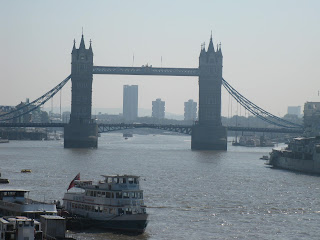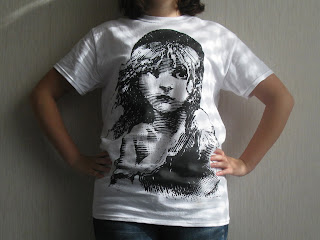I seem to be making a habit of getting immensely excited
about Shakespeare’s earlier plays that the rest of the world firmly regards as
”not very good” attempts by a man who was to become the Bard but was not yet at the height of his genius. Well, alright, Titus Andronicus was quite
impossible for me to like because it violated
the rules of drama even worse than its poor characters, but I have a very
special place in my drama geek’s heart for The
Comedy of Errors, The Two Gentlemen of Verona, and Timon of Athens – all of which are usually placed at the beginning of
Shakespeare’s career, way before the ”great ones”. Now the same thing has
happened with the three parts of King
Henry VI.
Shakespeare wrote two tetralogies, or series of four plays,
about five consecutive kings of Britain. Richard
II, the two parts of Henry IV and
Henry V are called the ”second
tetralogy” because they were written later, at a period when Shakespeare was
starting to write his ”better” plays according to scholarly opinion. The three
parts of Henry VI and Richard III are therefore called the
”first tetralogy” even though they actually take place after the second one. And even though Richard III was an instant hit at the time it was first performed
and is still one of the most frequently-staged and well-known plays in
Shakespearean canon, the first tetralogy as a whole is considered to be of a
less refined quality than the second.
Say what you will, Shakespeareans, but Henry VI was an absolute page-turner for me, all three parts of it.
I’m guessing that my attraction for these plays comes mostly from the fact that
I find everything related to the politics and machinations behind wars hugely interesting. Essentially, I’m a
war nutter – though I don’t really care for the part when people are actually
on the field going bang bang at each
other (or whatever the sound effect is in the case of swordfighting). So I
really shouldn’t have been surprised to find myself liking a series of plays
that depicts the Wars of the Roses. Here’s what happens: When the great warrior
king Henry V dies, the crown passes to his infant son. Henry VI grows up
heavily influenced by numerous noblemen of the court, including the Duke of
Gloucester who is Protector of the kingdom. Gloucester, though, is one of the
few who are actually loyal to the king, while most of the noblemen are scheming
for their own profit entirely. Richard Plantagenet harbours a grudge against
the royal house – the House of Lancaster – because in his eyes, the first
Lancastrian king was a usurper and the crown should have stayed in the
Plantagenet family. Even after King Henry makes him Duke of York, his hatred
for the Lancasters persists. He gets into an argument with the Duke of Somerset,
and the feud between the two men gradually grows into a fully-fledged war where
Somerset’s faction wants to keep the Lancaster king Henry on the throne, and
the Duke of York gathers supporters in order to take the throne for himself
and, as he sees it, right the original wrong that Henry VI’s grandfather did to
Richard II. This is not the only political strife going on – as was predicted
at Henry V’s death, Henry VI loses all the French territories that his father
conquered as his lords quarrel with each other and he is persuaded to make a
politically worthless match with Margaret, daughter of a French nobleman
somewhat down on his luck. When Margaret is made Henry’s queen, she takes an
immediate disliking to the Duke of Gloucester, who has too much power over the
king in her opinion. She gathers some noblemen on her side to finish off
Gloucester. The Duke of York dies in battle, but his sons keep up the Yorkist
cause – these sons will later become King Edward IV and King Richard III.
 |
| Edward IV, r. 1461-1470 |
Henry VI couldn’t really be more different than Henry V, his
father. His insignificance to the governing of Britain and the influence of the
noblemen over him is made very clear from the very beginning – unlike all the
other kings that Shakespeare wrote about, Henry VI doesn’t even appear till Act
III of the first play. From there, things just go downhill for him, but it
takes him quite a long time to realize just what his position is. Throughout
the first two plays, he often stands meekly by while the various noblemen and
his queen take turns in having massive rows in his presence, and even when he
finally points out in the end that he is the king and therefore entitled to
have his voice heard, Margaret has already taken his place as the symbol of the
Lancastrian cause.
The fact that Shakespeare wrote so few female characters
into his plays is an endless subject of woe for female enthusiasts – but I’d
say that when the man did create a
female character, they usually turned out damn fierce. Think about Lady
Macbeth, Cleopatra, Portia, Rosalind, Paulina, Emilia – and Queen Margaret. My
main motivation for reading through Henry
VI was so I could get properly, well-informedly excited about the superstar-cast
second series of The Hollow Crown. Now,
just the prospect of seeing Sophie Okonedo play Margaret through this most
interesting character arc is enough to reel my mind. She makes her first
entrance to the Henry VI series when
the English are fighting in France and the Earl of Suffolk, one of the many
devious noblemen, decides to make a match between Margaret and Henry (he can’t
marry Margaret himself because he already has a wife). His grand plan is to
become the power behind the throne through Margaret. However, Margaret appears
to possess quite a strong mind of her own. She plays an important part in
bringing down Henry’s last loyal advisor, the Duke of Gloucester. She then
feeds the flame of the Wars of the Roses by putting up a vehement opposition for
the Yorkists, even when Henry starts to give in. When the two factions are
lined up on the battle field, Margaret is also there, wearing armour, no
matter how unnatural the men in the Yorkist side find it. She is furiously
disappointed in her powerless husband and doesn’t keep quiet about it, and she
is also a mother protecting a son whose inheritance of the throne is in
danger.
As action-packed and intriguing as the Henry VI series is, it does have its slow moments and a couple of plot-holes. Especially the first part wouldn't suffer at all for having a couple of scenes snapped off entirely, and sometimes it seems that the same characters have more or less the same argument twice, as if these quarrelsome characters didn't engage in enough verbal sparring already. The reason for Somerset and York's disagreement is some vague stuff about some law thing; seeing as this unspecified legal dispute leads to all that rose-picking, several murders and a great big civil war, it would have been very considerate to let the audience properly in on the background. A couple of characters suddenly pop up during the last scenes of the second part and as late as the third part, which in itself is completely fine, but then these late-comers suddenly become vitally important to the machinations of the civil war. Compared against some of the other characters, whose personalities and motivations have been developed from the very beginning, these newbies feel a bit plastered-on. Also, you shouldn't expect Henry VI to be an objective account of the Wars of the Roses; Shakespeare is quite clearly taking the Yorkist side. Seeing as he was writing at the time of Queen Elizabeth, whose dynasty had been founded by Henry VII marrying Elizabeth of York (daughter of Edward IV), it would probably have been unwise to favour the Lancasters. Then again, once the war between the factions was done he didn't have any qualms about writing Richard III as the most evil king ever in his next history play...
Still, even with those flaws present, the Henry VI plays are a lot better than what their status as "early plays" gives to understand. Shakespeare's earlier works are most commonly criticized for having less refined dialogue and more violence, which in some cases is a fair judgement (Titus Andronicus, that means you). I have to say though, I really enjoyed the language in all the Henry VI plays. Even if it's not as elevated in style as, say, Hamlet, there are many places where Shakespeare conveys an idea with heart-clenching precision. Whenever Queen Margaret opens her mouth for a monologue, you can expect an absolutely chilling delivery, and various characters, including Henry in one of his very few longer speeches near the end, say some pretty thoughtful stuff about why exactly the crown is so much coveted, with all the trouble it brings. Lots of characters die – in battle or in the hands of political enemies – but I wouldn't say there's any gore just for the sake of goriness. Each death happens for a reason, even if those reasons are all connected to the devastating premise of a country fighting within itself.
Who's with me in hugely anticipating the second series of The Hollow Crown? I'll be reading and reviewing Richard III very soon, and then I'll have to do a post about the cast that has been revealed so far, because boy are there some wonderful actors included!
Still, even with those flaws present, the Henry VI plays are a lot better than what their status as "early plays" gives to understand. Shakespeare's earlier works are most commonly criticized for having less refined dialogue and more violence, which in some cases is a fair judgement (Titus Andronicus, that means you). I have to say though, I really enjoyed the language in all the Henry VI plays. Even if it's not as elevated in style as, say, Hamlet, there are many places where Shakespeare conveys an idea with heart-clenching precision. Whenever Queen Margaret opens her mouth for a monologue, you can expect an absolutely chilling delivery, and various characters, including Henry in one of his very few longer speeches near the end, say some pretty thoughtful stuff about why exactly the crown is so much coveted, with all the trouble it brings. Lots of characters die – in battle or in the hands of political enemies – but I wouldn't say there's any gore just for the sake of goriness. Each death happens for a reason, even if those reasons are all connected to the devastating premise of a country fighting within itself.
Who's with me in hugely anticipating the second series of The Hollow Crown? I'll be reading and reviewing Richard III very soon, and then I'll have to do a post about the cast that has been revealed so far, because boy are there some wonderful actors included!




















